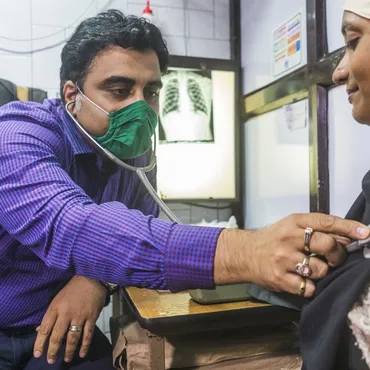Leveraging TV coverage to boost MND Association's reach
When Coronation Street featured Paul Foreman’s journey with Motor Neurone Disease (MND) in a major storyline, the MND Association saw a remarkable boost in visibility. As their digital partner, we helped to enhance this awareness to reach new audiences, drive engagement, and convert interest into tangible support.

MND Association

ITV
The results
- 40mil+ impressions
- 7k+ new email signups
- £145k+ in donation revenue
The client
MND Association
The Motor Neurone Disease Association (MND Association) achieved a remarkable boost in visibility when the popular UK soap Coronation Street featured Paul Foreman’s emotional journey with MND as a central storyline. Partnering with the show, MND Association gained a powerful platform to raise awareness, appearing at the end of the credits, running ad spots, and collaborating on talk show appearances featuring the actor.
As their digital partner, we helped harness this enhanced awareness to reach new audiences online, drive engagement, and convert interest into support.
This multi-channel strategy helped the MND Association raise awareness and secure donations and email sign-ups from people who might not have previously engaged with the cause.
Below, we explore the strategy, key steps, and insights from this successful campaign, offering a blueprint for how charities can make the most of any TV coverage—from adverts to documentaries to major soap operas.
The strategy
Getting started
Throughout the project, we closely collaborated with MND Association’s creative, PR, and web build teams to bring the TV activity into the online space.
Our main goal was to raise awareness, but we knew we could also get email newsletter sign ups and donations off the back of the increased good will from the public.
When planning a multi-channel campaign, we recommend bringing your digital partner in as soon as possible. It may not be immediately obvious that some aspects of the campaign could benefit from digital marketing expertise and your digital agency can support you with this. Some of the touch points we supported with were:
Campaign strategy
The Coronation Street storyline made people aware of what MND looks like and built empathy through the character’s story—we needed to turn that into action.
We couldn’t assume that someone who saw our online ads had also seen the TV activity, so the digital strategy needed to stand on its own. We planned a three phase campaign across Facebook, Instagram, Search, and Performance Max platforms:
Phase 1: Awareness - ask: Watch the video
Phase 2: Consideration - ask: Sign up with your email address to show your support
Phase 3: Conversion - ask: Make a donation
The obvious approach might be to run these campaigns one after the other, but in our experience people can move along this supporter journey very quickly so it’s beneficial to run all three types of activity at the same time.
Budget planning
We phased the budgets to start the campaign with mostly awareness-raising activity, then dialled up the consideration ads, and finished focusing mostly on the donation ask. Throughout each phase, we maintained the other two types of ads as well. However, it's not a simple curve; we also planned higher budgets at the beginning of the campaign because a fresh set of ads no one has seen before always garners an initial burst of interest.
Top tip: Don’t worry if ROI dips after the initial burst of activity. This phased approach means you gradually build interest and expect to get more donations at the end of your campaign.
Creative advice
While our team didn’t create the TV ad, we advised on calls to action and search terms so that people who saw the ad could easily find the MND Association online. We also offered guidance on adapting the video for Facebook, Instagram, Paid Search, and Performance Max ads.
Here are our top tips:
- Focus your creative on one goal at a time. If you want to raise awareness, explain how your organisation helps, and secure donations, consider creating three separate ads.
- Tailor video length to your objective—if your goal is to educate/raise awareness about your cause and encourage video views, a 30-second video is ideal. If you also want someone to take action after watching the video such as clicking through to your website, signing up for an email list, or donating, shorter videos of 10-15 seconds work better.
- Always include a call to action. Even if the primary goal is for viewers to watch the video, using headlines and descriptions that suggest action tends to enhance engagement.
- Check out our design team’s insights on creating elevated digital marketing creatives. https://torchbox.com/blog/design-powered-digital-marketing/
Landing page development
Our SEO team advised on how to maximise MND Association's visibility among the Coronation street audience. Our support included:
- Creating a content brief with insights from keyword research into the phrases people were most likely to search for
- Decision making on the benefits of creating new content vs updating existing content
- Recommendations to set up multiple pages with distinct audience needs, eg. separate pages for people looking to find out more about the Coronation Street storyline vs those looking to donate or find out more about MND
- Sharing examples of similar landing pages for the web agency to use as inspiration
- Tweaks to the on-page copy to increase likelihood of appearing for key phrases
- Technical checks of all landing pages for SEO meta information
Audience planning
The audience to target across all channels was determined by:
- Our knowledge of which audiences have responded to previous MND Association activity
- Insights about the typical Coronation Street audience
- Keyword research into the kinds of terms people were searching for around Coronation Street and MND
- Guidance on what had worked for other charities with long-term TV activity
- Broader digital audiences that would be narrowed down with AI-driven targeting
We were interested to see whether manual interest/keyword based targeting or AI targeting worked better at large scale. Our guidance went beyond digital channels as we advised on demographic and location targeting for TV and out-of-home ads based on insights from digital campaigns.
Setting up measurement
We advised on the KPIs for the campaign and provided projections based on previous performance benchmarks from both MND Association and other clients. KPIs included:
Awareness
Impressions, CPM, 75% video views
Consideration
CTR, Clicks, CPC, Cost per landing page view, email sign up, cost per sign up
Conversion
Donation volume, Revenue, Cost per donation, Average gift, Conversion rate
We set up conversion tracking for outcomes as well as the steps of the journey eg. clicks to start an email sign up or donation form, not just completions.
Once activity is live
When you’re running a campaign over several months, having a plan for ongoing optimisation is key. If audiences are seeing the same visuals over and over again, they will start to blend into the background and response rates will drop. We timed swapping out images and text with key moments in the Coronation Street storyline; when Paul’s mobility was worsening, we rolled out a creative with the same theme.
Other kinds of ongoing optimisation include:
Creative iteration
Turn off lower performing creatives, and make new variations of high performing ads.
Audience management
Turn off unresponsive audiences. If an audience is working well on one channel, see if there’s a way to reach the same type of person on another channel. Update email lists with new data regularly so that you’re retargeting people who have recently signed up, excluding people who don’t want to see your ads, and build lookalike audiences based on your most engaged supporters.
Budget management
Spend should be reviewed regularly (every day at the start of campaigns or during key moments, 2-3 times a week once activity is established) to ensure all channels are spending as expected. If a channel is over or underspending then budgets can be changed to get it back on track, or if the audience is smaller or less responsive than expected then it can be reassigned to a higher performing channel.
Introducing new channels
Microsoft made their version of Performance Max available during the campaign so we added it into our media plan. We kept the spend low as we just wanted to get enough data to test if it was working before committing significant budget. You can also identify new channels based on audiences that are performing well, for example if there’s an interest group that’s working well on Facebook could you show ads on a subreddit on the same topic.
Responding to search trends and PR
We reviewed the organic traffic bringing people to the Coronation Street pages and used the learnings to inform changes to the landing pages, and add keywords to paid search activity.
PR opportunities often come in at short notice, and we knew we had to be ready to get search ads live quickly to respond to new phrases people might be looking for. In this campaign, the Coronation Street actor appeared on talk shows, so we set up ads with the name of the talk show plus the actor’s name, character name, motor neurone disease, and other variants people might search for. We matched the ad copy closely to the previous ads so that it would be quick and straightforward to get sign off from MND Association stakeholders.
The results
Campaign success
The digital activity generated over 40 million impressions, over 7,000 new email sign ups, and over £145,000 in donation revenue.
When we look at the part digital channels played in the overall campaign we can see that it generated over 52% of the impressions (TV and out-of-home ads made up the remainder), and it was essential for the ongoing journey. Paid digital ads were particularly crucial for the middle "consideration" phase as 94% of email sign ups came from Meta, Performance Max or Paid Search. Organic search and email were the source of the majority of donations and it is gratifying to see that the funnel of viewer -> email supporter -> donor is so effective.

What comes next
Since the campaign was a huge success and the Coronation Street storyline continued, we launched a second phase of activity. The creative has been updated to lean into the donation ask more as we have already done a lot of the groundwork of raising awareness, educating about the issues faced by people with MND, and deepening engagement. We don’t want to oversaturate our audience by using the same approach for too long, so we are mixing in other types of campaign (eg. legacy, regular giving product, and community events) with visually distinct creatives.
The second phase is off to a strong start and we are excited to develop our relationship with this new raft of supporters brought in by the power of storytelling.



